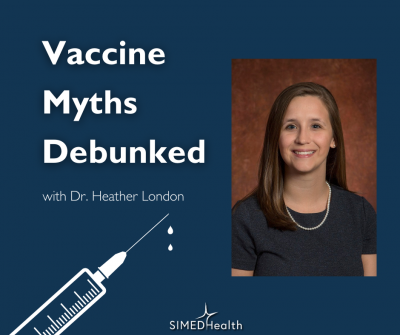
Vaccines: Myth versus Fact
Vaccines play a crucial role in instructing our immune system to combat infections more effectively. However, there's common misconceptions circulating about their connection to autism or causing infections. SIMEDHealth Family Medicine physician, Dr. Heather London, aims to debunk these myths and provide accurate information. Dr. London sees patients in Ocala; to schedule an appointment click here.
1. Myth or Fact? – Vaccines can infect you with the disease
Myth – Vaccines are made with an antigen, typically a portion or deadened part of a disease, to create a reaction in your body which turns on your immune system. This is how your immune system learns to fight and protect you from diseases. These antigens are not capable of causing you to get sick with the actual disease. If you are feeling unwell after a vaccine, it is usually due to your immune system working to help protect you from disease.
2. Myth or Fact? – The ingredients in vaccines are harmful
Myth- Most vaccines have been on the market for a while and the ingredients in the vaccines have been studied for safety. There are a number of vaccine ingredients which are used to boost the vaccine’s response in the body, stabilize the vaccine after being produced, grow the bacteria/virus to make the vaccine, and preservatives to prevent contamination. These ingredients are necessary to produce safe and long lasting vaccines.
A preservative, thimerosal, was at one point studied as a potential cause of autism due to its mercury content. Most vaccines have no mercury content. Multi-dose flu vaccines and tetanus vaccines may contain thimerosal, which contains a form of mercury. There are thimerosal-free versions available. Thimerosal has been studied by a number of health organizations and no evidence was found to suggest any health risks associated with this vaccine additive.
3. Myth vs Fact? – Vaccines can cause autism
Myth- Vaccines do not cause autism. There were a few studies that were initially reported linking the MMR (measles, mumps and rubella) vaccine to autism. These initial studies are one of the reasons many people chose not to get vaccinated. After review of these studies, it was discovered they either had many flaws in their design and reporting, or have been retracted, meaning the study was shown to have misrepresented data and was found to be fraudulent. If you have any concerns about vaccinations, please discuss them with your physician so that all information can be taken into consideration when making these decisions.
4. Myth vs Fact? – I don’t need to vaccinate because everyone around is already immune
Myth- The best way to ensure immunity from a disease is to be vaccinated. Not all people can be vaccinated for all diseases. There are people who are immunosuppressed or with allergies to vaccine ingredients, which do not allow them to be vaccinated or have an appropriate response to the vaccine. Herd immunity is when a certain percentage (usually very high 80-95%) of the population is immune to a disease, therefore preventing spread of the disease. This can be done with vaccination and allows those who cannot be vaccinated to be protected.
5. Myth vs Fact? – It is better to have the natural immunity by getting the disease than develop immunity through receiving vaccines
Myth- It is not better to have natural immunity. Our immune systems do not know the difference between antibodies from having a disease or getting a vaccine. Both ways result in protection from disease- one requires you being sick with the disease, while the other just requires a vaccine.
6. Myth vs Fact? – Vaccines prevent more than 20 life-threatening diseases, like diphtheria, tetanus, pertussis, influenza and measles
Fact- There are many vaccines that protect against dangerous and life-threatening diseases. Based on your risk factors, where you live and to where you travel, and your medical history, your doctor will make recommendations on which vaccines you may need to protect yourself.